Throughout the night, the train crossed the cold desert and mountains and eventually pulled into Kashgar at around 6:30AM. After a policeman had approached me on the train, I imagined that authorities might be waiting for me at the station for further questioning. But no one was interested in me. The police didn’t even bat an eye as I walked past them in the station lobby. Maybe the point of surveillance wasn’t actually whether there was a secret police watching me. Rather, it was about getting me to think about such a possibility and making me watch my moves. In any case, I was just a random tourist, and certainly not the center of the universe. I freely went through the security checkpoint and the sea of policemen to exit the station building. The sky was still pitch-black and the temperature was low in this far western edge of China. The cold morning air hit me from all sides. The crowd from the train soon went their separate ways to escape the cold, leaving me alone in the square outside the station.
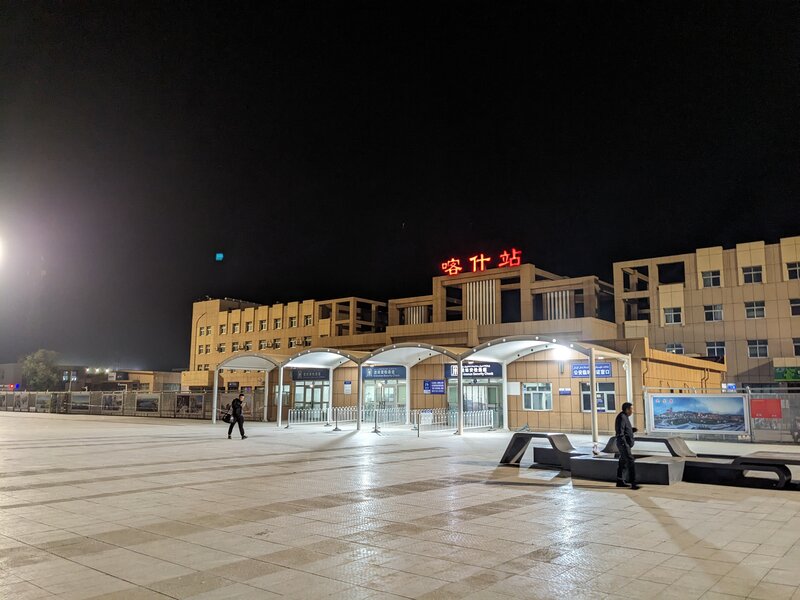
Kashgar station in the morning
Everything around the station was closed and the first bus wasn’t until after 8:00AM. There were just a few pedestrians and some taxi drivers who would occasionally ask me where I was going. Since it was pretty cold and I probably looked very suspicious wandering around by myself, I decided to seek shelter in a nearby underground passage where some shops and restrooms were located. The shops were closed, but the corridor was brightly lit, and a few people were loitering. I sat down in a paid massage chair next to some other locals. No one, including me, was actually paying for the chair, and every so often the chair would loudly and politely say something in Mandarin, probably telling us to pay up or get off. It was pretty loud and the position was quite uncomfortable, but I managed to fall asleep for a brief moment.
My half-awake mind wandered and tried to somehow piece together what was coming next. It was the sixth day of the trip to Dublin and I had sprinted here to the edge of China as fast as I could. But there was no way of knowing whether I was actually making good time, as I didn’t have the slightest clue what lay ahead. For the time being, I planned to spend one day in Kashgar to check out the place and prepare for the upcoming border crossing into Kyrgyzstan. I was weary from having slept on the trains and benches since the morning I left Beijing. I needed to rest up before attempting the crossing, which didn’t sound like a walk in the park. Since I had only one day in Kashgar, it didn’t feel right to sit around on that chair for very long. I waited anxiously for the first bus out of the station.
Eventually, the bus arrived and a long line of passengers formed out of nowhere. When I eagerly joined the line and stepped onto the bus, I found myself in the same situation as in Urumqi–the driver wouldn’t accept my cash, and everyone was paying their fare with phones. Once again, there was a huge line behind me so I didn’t know what to do. Just as I was starting to worry about how much delay this would mean, a passenger behind me paid for my bus fare and told me it was taken care of. I asked for his code for the payment app to transfer the money, but he waved it off and insisted that it wasn’t necessary. I thanked him and rode the packed bus in silence. Outside the window, dawn was about to break.
The first place I was headed was a holy Islamic site called the Abakh Hoja tomb, located on the outskirts of Kashgar. I wanted to check out the Islamic architecture in Xinjiang further because I didn’t have enough time in Urumqi the other day. Although the place wouldn’t be open until 10:00AM, I figured I’d go there and walk around the neighborhood to see what was out there. On the bus, two elderly Chinese ladies were sitting behind me and they happened to be headed to the same place. When I asked for directions, they told me that I could just follow them. We conversed in very basic Mandarin about where we were from and why we were in Kashgar. They said that it was their first time in Xinjiang and they were here to see what was there. We were the only passengers who hopped off at a stop nearby the tomb.
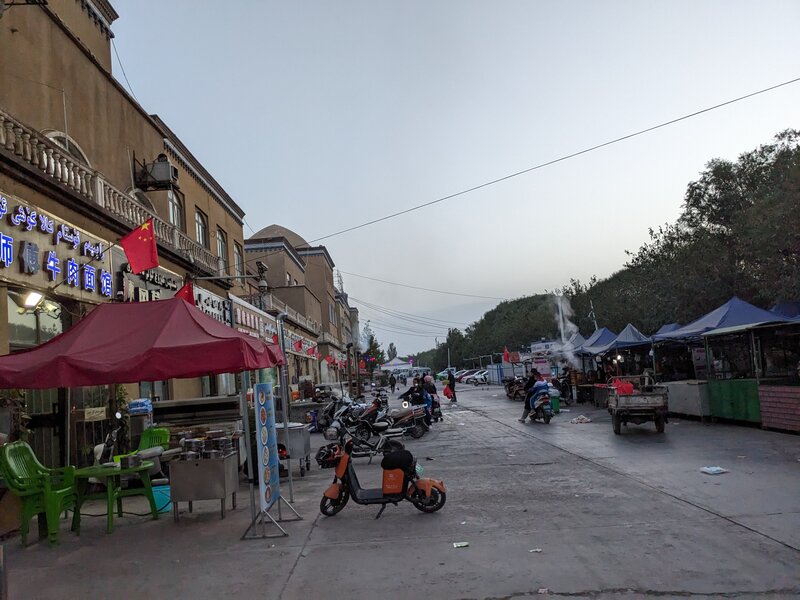
Outskirts of Kashgar slowly waking up
It was almost nine o’clock and the sky was growing lighter. Steam rose from restaurants and street food stalls as morning meals were being prepared. The roads were gradually filling up with motorcycles and children in uniforms on their way to school. The students were speaking their local language with their families and among themselves. I wondered whether the school subjects were in their language or Mandarin, but I didn’t know how to go about asking. Besides, I was pretty hungry because I hadn’t had much to eat since the breakfast Sam treated me to in Urumqi. So I wasn’t really in the mood to stop and ask strangers random questions. I had also been having a persistent stomachache since Beijing and didn’t want to take a chance on a random restaurant in an unfamiliar area. So I just walked around and watched the streets and the people.
Once again, people’s appearances changed. There were a lot more Uyghurs here than there were in Urumqi. More people were wearing their traditional hats. And the local languages were heard more often among those who walked or drove by. As I was walking, a local butcher was moving some animal carcasses from a wooden cart into his shop. Noticing that I was looking at him with interest, he asked me in Mandarin, “Ni shi Zhongguo ren ma?” (“Are you Chinese?”). “Wo shi aodaliya ren” (“I am Australian.”), I replied. He extended his hand with a warm smile and we shook hands. His distinct accent and appearance reminded me how diverse China was, and that I was really in Xinjiang.
After roaming for some time, I went over to the Abakh Hoja tomb. It was located in a park, and there were many different structures with Chinese, Islamic, or mixed styles of architecture. Many of the buildings looked like something out of the Middle East or Central Asia. I gazed in awe at the arched gates decorated with mosaics and the domes crowned with crescent moons. As I was taking pictures of the buildings, I came across a group of middle-aged Korean tourists who asked me to take a photo for them. We were surprised to find compatriots in Xinjiang and made brief small talk. “How did you end up in this faraway corner of the world?” one gentleman asked in Korean. I didn’t know how to explain the reasons clearly, so I just said that I was trying to cross the Silk Road to head to Europe. Luckily, they didn’t ask me why. I wouldn’t have known what to say as I didn’t really understand the reason myself.
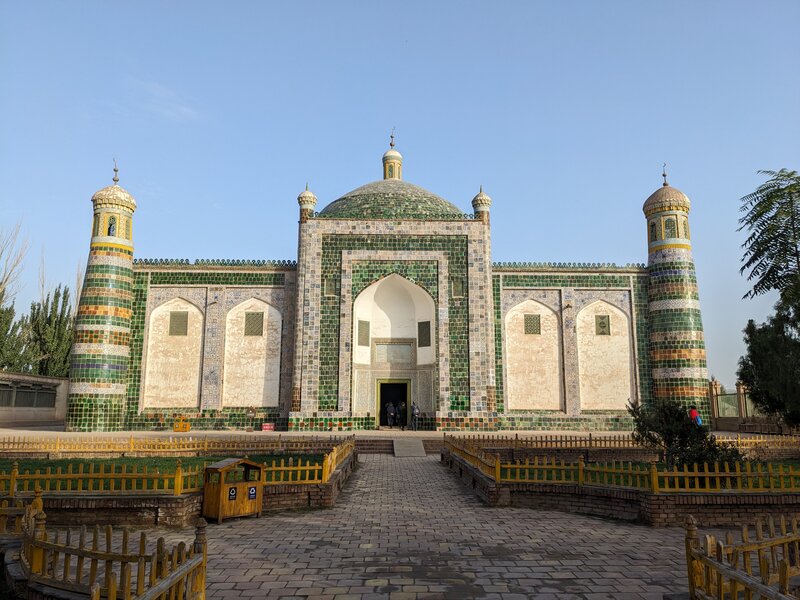
The Abakh Hoja tomb showing the rich Islamic history of the region
At around eleven o’clock, I thought I’d head to the city center to drop my backpack at the hostel and have some food. My hostel was easy to reach because it was located inside the so-called old city of Kashgar near the center. The old city was full of exotic buildings and narrow, winding passageways. Trying to navigate the crisscrossing alleys surrounded by buildings in styles I had never seen before, I felt disoriented and strangely confused about where I even was. It just didn’t feel like the China that I had seen or thought I had known thus far. It felt like I was a character roaming a desert city in a role-playing game, and I thought I was going to have to start completing quests to find hidden loot buried outside the town. The only clear reminder that I was still in China was the abundance of Chinese national flags everywhere on the walls of the buildings. I wasn’t sure whether they were always there, or only during Golden Week. Although I would later learn that the actual old town was bulldozed and rebuilt into the current form, the place was magical to behold and made me appreciate the unique culture and history of this region.
I sat down at a restaurant in the old city and ordered some mutton–the same dish that Sam and I had in Urumqi. On a nearby table, some boisterous locals were having delicious-looking dumplings. I wanted some as well, but all the menus were in Mandarin and Uyghur, and no one seemed to speak English. So I pointed to what the locals were having and said to the waiter, “Qing Zhege” (“Please, this one”). The locals found it pretty amusing and taught me that the dumpling was called Baozi. Despite the language barrier, we had a casual chat on random topics like movie stars and mixed martial arts. The mutton and the Baozi were both excellent, especially after over twenty-four hours without a proper meal.
After finishing their meals, the locals wished me good luck and went on their way. I was done soon after, and started heading to the hostel. Since it was still a bit early for check-in, I dropped my backpack and took a bus to the northern part of town to see a museum. The bus passed through many rougher, less developed parts of the city that looked very different from the old town and the modern city center. The contrast made me curious about the lives of the ordinary residents of Kashgar, far from all the handsome presentation.
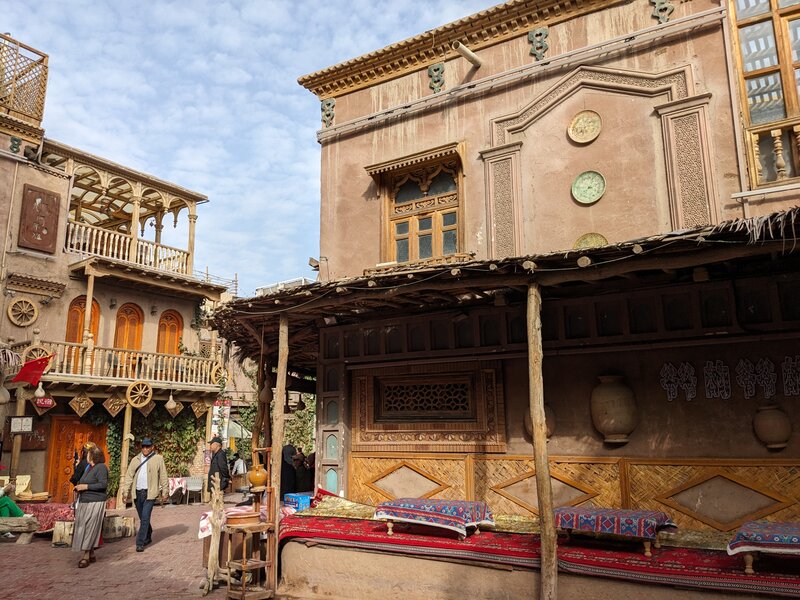
Kashgar’s old city.
When I got back to the hostel and checked in, I took a shower for the first time since leaving Beijing four days ago and did my laundry. In some ways, the laundry mattered more than the shower. I was almost out of clean clothes, and with the strong possibility of being on the road for days after crossing the border, I needed to be prepared. I nervously waited for my laundry to be done so that I could hang it up. Everything needed to be dry and ready to go by the next morning when I would head to the border. Sensing my restlessness, a receptionist told me in a friendly tone that we were in the middle of the desert and that the laundry would dry in no time.
While sitting in the lounge waiting for my laundry to finish, I struck up a conversation with a fellow traveler named James. He was from Shanghai and was into photography. On his camera, James showed me some of the pictures he had taken of local people and told me that he found Uyghur people to be interesting subjects. Kashgar was fascinating to him because it had a far larger local population than Urumqi, where he had just been before. “After coming here, I used up my memory cards,” he jokingly said. He added that he was planning to head out soon to take some more photographs, and we decided to explore the town together. We had around an hour because we were invited to join other travelers from the hostel to head to a local wedding reception for dinner. It was apparently taking place at a fancy restaurant and we were welcomed there.
So the unusual duo set out–James, carefully framing shots with his professional camera, and me, a total amateur waving my action camera at whatever happened to catch my eye. As we walked, James pointed out things that I would have otherwise missed, such as local schools and posters for popular shows. We also talked about life in China after college and how hard it was to find a good job in Shanghai. The struggles of youth seemed to bear the same marks no matter where you were in the world. On our way back, we passed a food stall selling local bread that was everywhere in Xinjiang. The bread was round and flat, with patterns imprinted on it, sometimes with light toppings. I took a photo of the neatly displayed loaves and mentioned to James that I hadn’t tried the Uyghur bread yet. James looked surprised and said that the bread was a staple in Xinjiang, and that I should really try some at dinner.
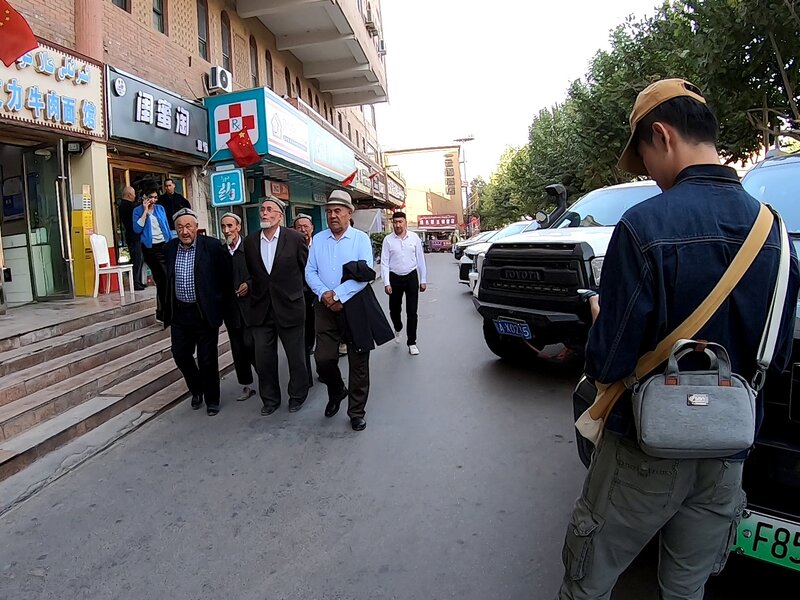
James looking professional, and me following with my meager GoPro
When we returned to the hostel, people were getting ready to head to the Uyghur wedding. There were around eight of us, all hailing from different parts of China, and me from Australia. We split into two groups and called the cabs to get to the venue. All I had to wear was a pair of gym shorts and a T-shirt because I had washed everything else. Seeing my outfit, people smiled and warned me that it would get colder at night and that I had better wear something else. So I reluctantly put on a wet pair of sweatpants straight from the clothes hanger. They weren’t dripping but were still completely wet and left a huge water mark on wherever I sat. We rode through the modern downtown Kashgar to eventually arrive at the venue. The wedding hadn’t started yet, so we sat down, ordered some food, and relaxed. Almost no one in the group spoke English, but that turned out to be less of a problem than I had expected. Somehow everyone understood what I meant, and I understood them too. By the time my sweatpants had almost dried, loud music began to play and a parade of people streamed into the hall. They were playing traditional instruments, singing, and cheering. In the center of the group were the bride and groom, surrounded by their friends and family.
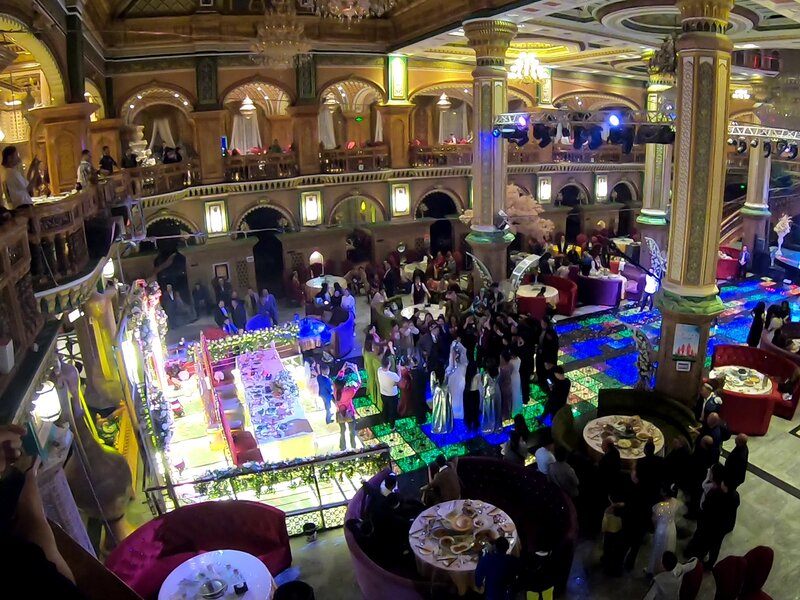
A Uyghur wedding
The festivity went on for hours. There was dancing, a few brief ceremonies, and some more dancing. At some point, it was hard to tell whether it was a wedding or a rave. The DJ was blasting some loud electronic dance music and everyone was jumping up and down in a circle around the bride and groom. That dancing circle looked really fun, although I didn’t join in because the dance floor seemed to be for the friends and family only. From our table on the second floor, I watched the celebration unfold. As I looked on, I began to realize that there was an entire world beyond the tiny space I occupied every day. Until that day, I didn’t even know that all these people existed. But thanks to a series of fortuitous events that followed after traveling to this remote part of the world, I was there celebrating a wedding with them.
A vague idea began to take shape in my mind, and would stay from that point on. It was an idea that there were people outside my bubble. The daily grind back home, the relentless push to advance my career, the train commute to and from the city, the tiny gym I went to after work, the familiar faces I greeted by name–all of that was merely a part of the bubble that I had built up around myself, the one I was too scared to let go of. Beyond that tiny bubble over which I ruled, there were people filling the streets to celebrate their national holiday, the conductors working overnight on the train across China, the policemen checking up on a strange foreigner, the fellow travelers from all over China, the bride and groom and everyone else in their wedding. We might grow familiar with our little domain and even become something of an expert in that realm. But the bubble was merely an infinitesimal fraction of what was actually out there. I realized that I knew nothing about the world.
When we came back to the old town late at night, the streets were bathed in warm light and the cool air under a cloudless desert sky. We navigated the crisscrossing alleyways to find our way back to the hostel. Once we arrived at the hostel, I was desperate to plan for the next day’s big border crossing into Kyrgyzstan. It wasn’t a route commonly traveled, and I wanted to do some more research on what to expect. For starters, I didn’t even know how to get to the border. But instead of planning, I ended up chatting with other travelers and playing a board game until well past midnight. I thought I’d figure something out tomorrow–things would probably be more interesting that way.
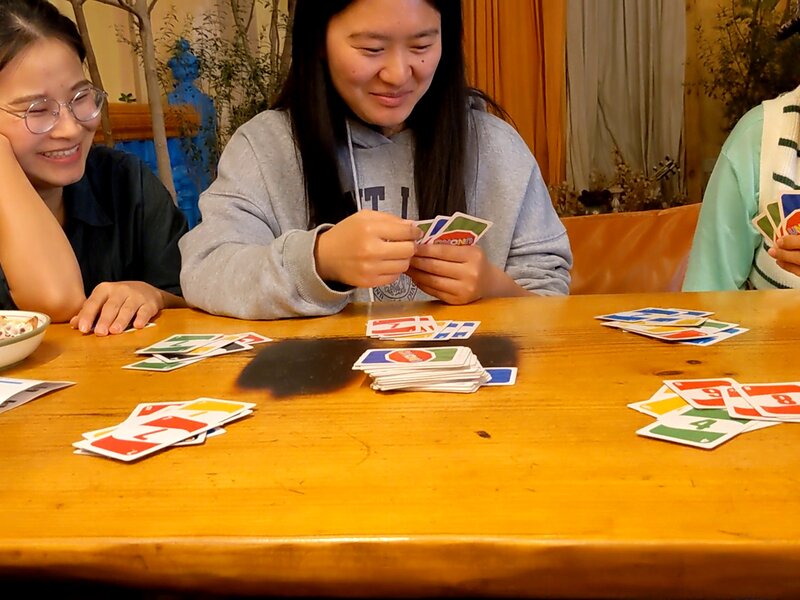
Trying to reverse engineer the rules of Uno and the correct Mandarin phrases to say
Uno was the game of choice at the table, and I was invited to join. I watched a few rounds to reverse-engineer what Mandarin phrases to say when playing certain cards. For example, when someone played a three of yellow, they were supposed to say “Huang San”–“Huang” for yellow, “San” for three. When changing a color, for example to red, they would say “Hong Se”– “Hong” for red and “Se” for color. There were only four colors so I built a mental model of what those colors were and which words were associated with them. And I also made a note of some trickier words like “Jiang” which seemed to be for reversing the order. When I joined in, everyone carefully and awkwardly switched to English, somewhat uncomfortably. When it was my turn to play a card and I said the right combination of words in Mandarin, the whole place went wild. We carried on in Mandarin.
While sitting around and chilling, I happened to mention my plan to leave the next morning to cross the Irkeshtam Pass in the mountains between China and Kyrgyzstan. No one had heard of Irkeshtam or knew how to get there. But a few people quickly looked it up and told me that I might first need to go to the “Kou An,” which they explained meant “customs office.” Kou An was still over 100km (62mi) away from the actual border.
Apparently, there was someone who was going to drive to the westernmost part of China the following morning. He was from the group that went to the Uyghur wedding earlier, and introduced himself as Evan. One of the girls explained to him that I wanted to go to “Jierjisisitan,” and a lively discussion about possible routes ensued. After looking at the map for a bit, Evan coolly said that I could ride with him, and he would drop me off at Kou An since it wasn’t too far off his route. How I would get to the actual border from Kou An was still a mystery, and the sheer distance on the map looked rather intimidating. But I figured I would find a way once I reached Kou An.
After midnight, people began dispersing and the lounge area became less crowded. Soon it was only me and James, who had come back from the Uyghur wedding very late because he was so fascinated with it. He gave me two large pieces of Xinjiang bread as a gift, and said that I would need some food for my border crossing tomorrow. We talked about random topics until after one o’clock. When I finally decided to turn in, I fell asleep as soon as my head hit the pillow. It was the first time I had slept on an actual bed since leaving Beijing four days ago.